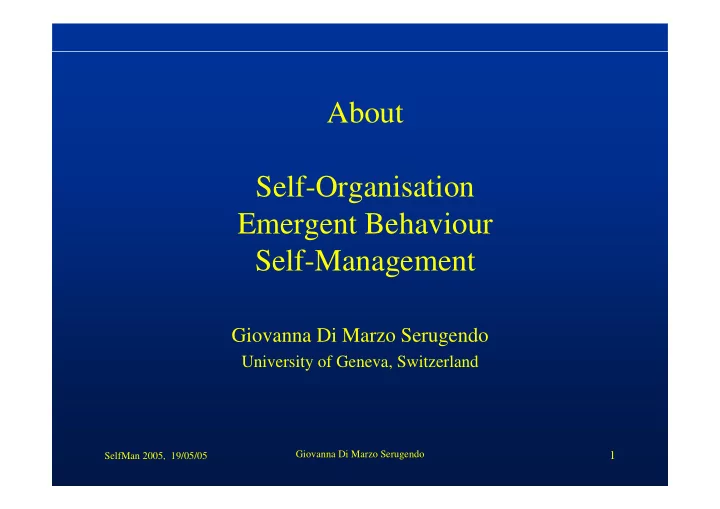

About Self-Organisation Emergent Behaviour Self-Management Giovanna Di Marzo Serugendo University of Geneva, Switzerland Giovanna Di Marzo Serugendo 1 SelfMan 2005, 19/05/05
Self-Organisation • Definitions – Swarms: coordination and regulation through environment without central control (stigmergy) • Self-org occurs results from behaviour inside the system – Thermodynamics: open systems decrease entropy when external pressure is applied (decrease of entropy) • Self-org is the result of pressure applied from the outside – Cells: self-maintenance of system of system through self- generation of system’s components (autopoiesis) • Essentially: capacity to spontaneously produce a new organisation in case of environmental changes Giovanna Di Marzo Serugendo 2 SelfMan 2005, 19/05/05
Emergent Behaviour • Definition – Structure (pattern or function), not explicitly represented at a lower level, appears at a higher level • Essentially – Observed pattern or function but it has no causal effect on the system itself (stones ordered by sea) – Observed function which has a causal effect on the system • This function can be desired or not!! (in both cases it has an effect) • Not always needed or required or good for the system Giovanna Di Marzo Serugendo 3 SelfMan 2005, 19/05/05
When Self-Org meets Emergence • Self-Org can be independent of Emergent behaviour – Self-Org can happen without emergent behaviour • If central control – Emergent Behaviour can happen without self-organisation • No (re-)organisation • Self-Org + Emergent Behaviour when: – Dynamic Self-Organising Systems – Decentralised Control – Local Interactions Giovanna Di Marzo Serugendo 4 SelfMan 2005, 19/05/05
Self-Management • Decentralised control • Adaptation to changes (re-organisation?) • Local knowledge of individual components • Desired result: self-management – Then … self-org + emergent behaviour • Maybe more complex … • Three aspects: – Self-managing system itself – Any additional resource this system manages (self-managed system) – Interaction with human administrator • Ex. Self-managing distributed operating system Giovanna Di Marzo Serugendo 5 SelfMan 2005, 19/05/05
Current Solutions for Self-Org/Emergence • Reproducing natural self-org mechanisms – Biology or Social Behaviour (insects, humans, etc.) – Direct interactions / Reinforcement / Adaptive Agents / Cooperation / Middleware • Strengths – Robust / Adaptive / Simple individual components • Limits – Controlling emergent behaviour – Designing those systems – Implementing supporting infrastructures Giovanna Di Marzo Serugendo 6 SelfMan 2005, 19/05/05
Issues for Self-Management • Software engineering of systems with both – Self-org and Emergent Behaviour – Needs: to define a global goal and to design local behaviour (making the global expected behaviour to happen) • Control / Design of decentralised behaviour – Good properties have to emerge – Bad properties to be avoided! – Control and emergence are contradictory – Which kind of self-organisation do we need? Giovanna Di Marzo Serugendo 7 SelfMan 2005, 19/05/05
Issues for Self-Management • What about environment – Where is the border? – How to take into account the environment? • 3 Aspects of Self-Managing(ed) Systems – Managing itself – Managing resources (environment?) – Human interaction with self-managing system (2 directions) • From Human to System (decomposition of high-level goal) • From System to Human (coherent global info produced by local decentralised info) Giovanna Di Marzo Serugendo 8 SelfMan 2005, 19/05/05
Recommend
More recommend